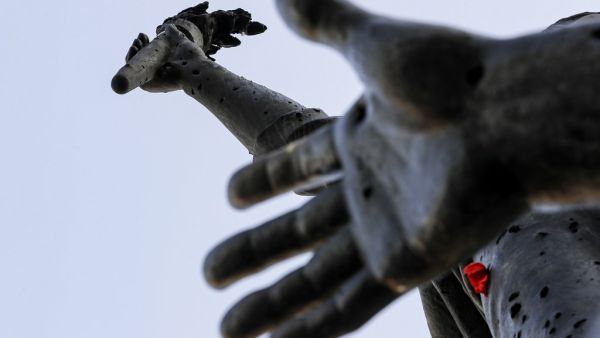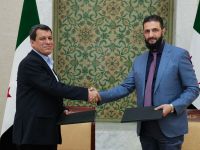Lebanon’s widespread demonstrations are already inspiring writers to pen new work, adding a note of literary reflection to the roar of revolution.
“Early Writings of the Revolution,” an open mic event Aaliya’s Books in Gemmayzeh Tuesday night, was packed with people wanting to listen to speakers present original poems, personal essays and spoken-word manifestos. Event organizer and bookstore waitress Carmina Khairallah said the event had originally been scheduled to be a poetry slam competition, but was retooled to better reflect the current atmosphere.
While speakers’ tone and topics varied, all expressed fervent support for the demonstrations, connecting recent weeks’ political upheaval to their own personal experiences.
One man spoke about the challenges of finding a job with decent pay. A woman joked that, having exhausted Tinder, she was trying to sleep her way through all 18 of Lebanon’s sects to encourage peaceful coexistence.
One speaker complained that his noisy neighbors bribed police to ignore their slapstick transgressions. Another explained that because he was born to a Lebanese mother and Syrian father, citizenship laws left him an alien in his own country.
{"preview_thumbnail":"https://cdn.flowplayer.com/6684a05f-6468-4ecd-87d5-a748773282a3/i/v-i-f…","video_id":"fb3037fe-ed45-4d06-b148-983226c6daa1","player_id":"8ca46225-42a2-4245-9c20-7850ae937431","provider":"flowplayer","video":"Hiba al Labadi, Abdulrahman Miri Back Home in Jordan"}
In the first half of the evening, writers read aloud from prepared works. At intermission, Khairallah distributed paper and pencils and urged audience members to compose their own writings on the spot and present them during the second half of the evening.
This strategy was inspired in part by necessity, Khairallah explained. Writers had only three weeks to produce work about the protests, she said, and had almost certainly been busy on the streets themselves. The event’s intermission, she said, encouraged them to put their experiences into words.
“We have all been asked to keep our egos in check, for us to be united as one nation,” Khairallah told The Daily Star, “but at the end of the day we are still just human. We still have all our own hopes, dreams and fear. This [event] gives us a platform to express that at an individual level and in an intimate setting.”
Khairallah was particularly glad to have created a space that could host a diverse range of voices. Of the nine people who presented during the evening, three were Lebanese citizens, three were Lebanese dual nationals, two were foreigners and one was a stateless, lifelong resident of Lebanon.
Several speakers celebrated the essential role played by women in the demonstrations.
Though most writers read work they’d composed in English, a few opted for Arabic, or drew on both languages. Sara Tlakki shared an Arabic-language poem about feeling torn between her love for Beirut and her frustration with the city’s inequities. She said her use of language depended on her topic and emotional undercurrent. She writes about her family and Lebanon in Arabic, expresses herself romantically in French, and argues in English.
A design consultant and artist, Tlakki characterized artistic expression as a “revolution from within.” She said that producing creative and written works was important to sustaining political momentum.
“You get to touch the heart of people,” Tlakki said. “Art has an emotional resonance. Nobody wants to watch the news 24/7.”
Ramzi Mallat echoed Tlakki’s remarks, saying he wanted to help motivate people toward activism.
Among the audience members who heeded Khairallah’s call for spontaneous creation, he scribbled a few pages of verse during the break. Mallat said he was primarily a visual artist, but had felt drawn to incorporating writing and lyricism into his work since the protests began. While it was not practical to bring a painting to a demonstration or event, he explained, words could be spoken “everywhere in unison by everyone.” He also expressed an appreciation for the precision and clarity a well-crafted sentence could afford an artist, particularly to convey political ideas.
“At the end of the day, a visual piece is very easily interpreted differently by every person who looks at it,” Mallat said. “I had to write something to let free a voice that could not be omitted or ignored by [viewers’] perspectives.”
As the evening wound down, Mallat took the microphone. He read the last few lines of his poem slowly, seeming to savor their ecstatic significance: “Our collective consciousness cannot be silenced or dissipated anymore.
“It is said there is power in numbers but neither of us can count the amount of injustice we bear. Rejoice. Our time is now.”
This article has been adapted from its original source.








